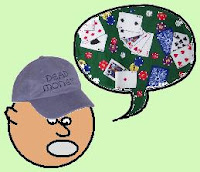Poker and the English Language
 I occasionally talk here about how impatient I sometimes get with poker-related analogies. For instance, about a year ago I referred to the Poker Shrink noting how he wasn’t “a big fan of the ‘Poker is like Life’ books and articles” because, in his view, most of them end up being “too general to carry any more wisdom than a dribble glass.” I agreed with the Shrink in saying I also didn’t care much for these analogies -- most particularly when they end up making one’s meaning more vague rather than helping clarify what it is one is trying to express.
I occasionally talk here about how impatient I sometimes get with poker-related analogies. For instance, about a year ago I referred to the Poker Shrink noting how he wasn’t “a big fan of the ‘Poker is like Life’ books and articles” because, in his view, most of them end up being “too general to carry any more wisdom than a dribble glass.” I agreed with the Shrink in saying I also didn’t care much for these analogies -- most particularly when they end up making one’s meaning more vague rather than helping clarify what it is one is trying to express. In other words, I ain’t too keen on someone proclaiming “Poker is like life” and leaving it at that, though I do often appreciate the many ways poker presents us with situations that resemble those we face elsewhere, and thus occasionally provides interesting ways to talk about and assess those non-poker situations. And yeah, I, too, will indulge in such making comparisons now and again, as it is both fun and occasionally even useful.
That said, one has to be careful not to introduce unwanted vagueness when making such comparisons. Another danger one faces when choosing to employ poker-related metaphors is to fall into stale, overused phrases and clichés -- also not recommended if the goal is to engage an audience.
The abundance of poker terms and phrases in everyday English is testament to the game’s popularity and significance. But this abundance also means many of these terms and phrases have become pretty well worn by now. People everywhere are constantly bluffing each other. Or upping the ante. Or noting when the chips are down. Or passing the buck. Or trying their hand at something. Or singing that he can’t read my, can’t read my, no he can’t read my poker face. Or warning you about that guy being a wild card, with an ace in the hole. Or up his sleeve. Or simply being an ace.
 I’m reminded of George Orwell’s still relevant 1946 essay “Politics and the English Language” in which he laments the decline of the language in various contexts, but most especially in political speech and writing. Among his many warnings listed there, Orwell advises readers to avoid “dying metaphors” if at all possible. In his list of examples Orwell does include one poker-related one -- “playing into the hands of” -- and I’d imagine he’d list most of those appearing in the previous paragraph, too, as often introducing an unwanted “loss of vividness” in one’s language.
I’m reminded of George Orwell’s still relevant 1946 essay “Politics and the English Language” in which he laments the decline of the language in various contexts, but most especially in political speech and writing. Among his many warnings listed there, Orwell advises readers to avoid “dying metaphors” if at all possible. In his list of examples Orwell does include one poker-related one -- “playing into the hands of” -- and I’d imagine he’d list most of those appearing in the previous paragraph, too, as often introducing an unwanted “loss of vividness” in one’s language. Last week Tiffany Michelle appeared on Fox News to chat with Neil Cavuto, ostensibly to discuss the current status of President Obama’s efforts to introduce health care reform and all of the legislative tangling -- and political fallout -- that has occurred in connection to those efforts thus far. Why Michelle? Well, because she’s “a professional black jack and poker player” -- i.e., a gambler -- and someone thought it would be a good idea for a person who understands risks and rewards to comment.
Bill Rini wrote a bit about the segment last week in a post that also has the embedded video. Then he came back and transcribed the whole sucker. As Rini points out, the conversation between Cavuto and Michelle -- coming in at just under five minutes -- is more than a little cringe-worthy, primarily because of the not terribly successful attempt to describe everything in terms of poker or gambling metaphors.
 It appears that Cavuto (and Fox) mainly wanted to say that Obama has “a bad hand” here and should fold. And perhaps -- as Cavuto hastily adds at the end -- also to charge that the President isn’t playing with his own money, but with the taxpayers’. So they brought Michelle on to help communicate that message, but Cavuto’s questions were so imprecise those (essentially banal) observations barely came through, if at all.
It appears that Cavuto (and Fox) mainly wanted to say that Obama has “a bad hand” here and should fold. And perhaps -- as Cavuto hastily adds at the end -- also to charge that the President isn’t playing with his own money, but with the taxpayers’. So they brought Michelle on to help communicate that message, but Cavuto’s questions were so imprecise those (essentially banal) observations barely came through, if at all.If you’re curious, check out Rini’s transcript and/or watch the video. I actually wouldn’t fault Michelle too much here -- she does pretty well, I think, to try to respond to Cavuto’s garbled clichés, and in fact probably saves the whole segment from becoming utterly inscrutable.
The hosts of The Poker Beat discussed the segment a bit on their show last week, and there tourney reporter B.J. Nemeth did a good job summarizing why it failed -- and why I am sometimes impatient with poker-related metaphors that tend to obscure more than clarify. “The whole point of an analogy is to try and make something easier to understand,” said Nemeth, “and I think what they did is took something the [viewers] had some grasp of and made it incomprehensible.”
Then again, as Orwell notes, what Nemeth is describing is often what happens when language is employed for political purposes. Writing in the wake of the second World War, Orwell notes how “Political language -- and with variations this is true of all political parties, from Conservatives to Anarchists -- is designed to make lies sound truthful and murder respectable, and to give an appearance of solidity to pure wind.”
Perhaps the stakes were a bit higher then (to use a dying metaphor). But Orwell’s desire for us to view “language as an instrument for expressing and not for concealing or preventing thought” is still worth reiterating.
Labels: *the rumble, B.J. Nemeth, Bill Rini, Fox News, George Orwell, Neil Cavuto, The Poker Beat














0 Comments:
Post a Comment
<< Home